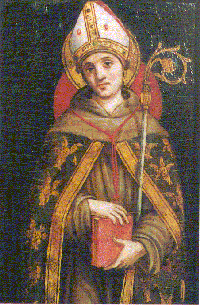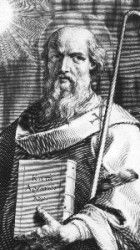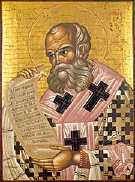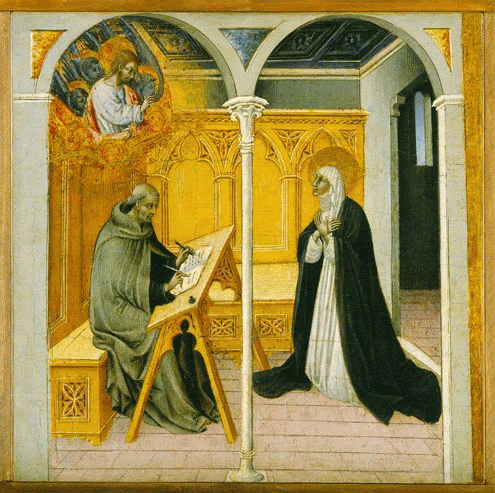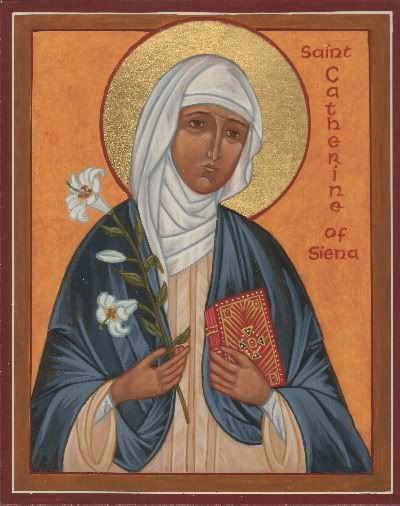"He became what we are that He might make us what He is."
Today, May 2, we celebrate the feast of
Saint Athanasius (296-373), bishop, and Doctor of the Church. Athanasius has been called "the Father of Orthodoxy," "the Pillar of the Church," and "Champion of Christ's Divinity." Cardinal Newman described Athanasius as "a principal instrument after the apostles by which the sacred truths of the Church have been conveyed and secured to the world." He is venerated as on the four great Greek Doctors of the Church, and in the East, is considered one of the three Holy Hierarchs. Saint Athanasius is primarily responsible for defense of the true faith against the Arian heresy.
Born in Alexandria, Egypt, Athanasius exhibited piety from an early age, attending to his studies, learning and memorizing the sacred texts. He left his home, while still a child, to be raised by the bishop of Alexandria, who after observing him playing with his peers, pretending to baptize them into the faith, was so impressed with the child took him as his pupil.
The future saint received an excellent education at the catechetical school of Alexandria that encompassed Greek literature and philosophy, rhetoric, law, and Christian doctrine. His intimacy with Biblical texts is extraordinary. In his own writings, he tells us that he learned theology from teachers who had been confessors during the Maximian persecution. From early youth, he formed a close relationship with the hermits of the desert, which was to prove providential during his exiles because they protected him during several of them

Eventually, the bishop of Alexandria, Saint Alexander, appointed Athanasius deacon, and invited him to attend the Council of Nicea. There, he garnered much attention, demonstrating his learning and ability, defending the faith against Arianism and other heretical beliefs. It was only a short time later that Saint Alexander took ill, and recommended that Athanasius succeed him as Patriarch of Alexandria. For 46 years, Athanasius served in that post, bearing the full brunt of the Arian assault (which claimed that Christ was not divine), oftentimes on his own. For his troubles, he was exiled on five separate occasions, stood firm against four separate Roman emperors, received countless death threats, and stood accused on multiple occasions of all insults, sins, and transgressions. Each time, his hope in the Lord, unwavering commitment to the faith, and model of Christian virtue remained unscathed and victorious.

Though zealous in his defense of the Faith, he was meek and humble, pleasant and winning in conversation, beloved by his flock, unwearied in labors, prayer and mortifications, eloquent in speech, and unsurpassed in zeal for souls. From his places of exile he wrote many great works for the instruction and strengthening of his flock, writings rich in thought and learning, clear, keen and stately in expression. Following his seminal treatise on the Incarnation, Athanasius authored ‘Against the Heathen’ (c. 318), ‘Contra Arianos’ (c. 358), ‘Apologia to Constantius,’ ‘History of the Arians’ (primary historical source), ‘Defense of Flight,’ many letters, ‘The Life of Antony’ (c. 357) in which he chronicled the life of the famous desert hermit, and may other manuscripts. From the time of Saint Bede, his approach to writing inspired other monastic hagiographers. An 8th-century monk wrote, "If you find a book by Athanasius and have no paper on which to copy it, write it on your shirts."
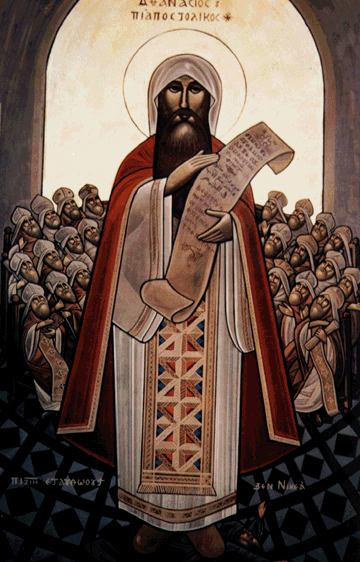
As bishop, Athanasius began a visitation of his entire diocese. He took responsibility for the welfare of the desert monks and fathers who resided in the area. He became their spiritual head for 40 years. He aided the ascetic movement in Egypt, counted Saints Pachomius and Serapion among his friends, and was the first to introduce the knowledge of monasticism in the West. About this time he was also appointed bishop of Ethiopia, where the Christian faith had recently found a footing.
When he returned to Alexandria after his final exile, Athanasius spent the last seven years of his life helping to build the Nicene party. Upon his death, his body was taken first to Constantinople and then to Venice, where it is venerated today.
Saint Athanasius suffered considerable trials and persecution during his tenure as bishop of Alexandria. Yet, despite his constant opposition, he held firm to his beliefs, hope in the Lord, and received the grace from God to remain strong and convicted. He defended the true faith, looked to Our Blessed Mother as a source of hope and comfort, and zealously faced heresy for the sake of his congregation, at great personal cost to himself. We are inspired, during this Easter season to follow in his footsteps, firmly marching toward the kingdom of heaven.
Selected Quotations from Saint Athanasius:
"All of us are naturally frightened of dying and the dissolution of our bodies, but remember this most startling fact: that those who accept the faith of the cross despise even what is normally terrifying, and for the sake of Christ cease to fear even death. When He became man, the Savior's love put away death from us and renewed us again; for Christ became man that we might become God."
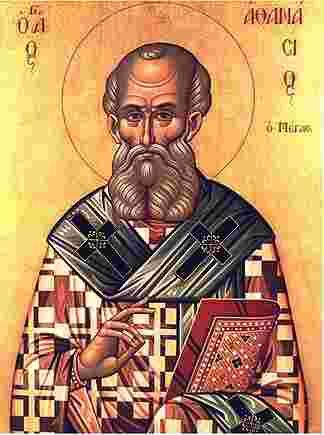
“Brethren, how fine a thing it is to move from festival to festival, from prayer to prayer, from holy day to holy day. The time is now at hand when we enter on a new beginning: the proclamation of the blessed Passover, in which the Lord was sacrificed. We feed as on the food of life, we constantly refresh our souls with his precious blood, as from a fountain. Yet we are always thirsting, burning to be satisfied. But he himself is present for those who thirst and in his goodness invites them to the feast day. Our Savior repeats his words: If anyone thirsts, let him come to me and drink. He quenched the thirst not only of those who came to him then. Whenever anyone seeks him he is freely admitted to the presence of the Savior. The grace of the feast is not restricted to one occasion. Its rays of glory never set. It is always at hand to enlighten the mind of those who desire it. Its power is always there for those whose minds have been enlightened and who meditate day and night on the holy Scriptures, like the one who is called blessed in the holy psalm: Blessed is the man who has not followed the counsel of the wicked, or stood where sinners stand, or sat in the seat of the scornful, but whose delight is in the law of the Lord, and who meditates on his law day and night. Moreover, my friends, the God who first established this feast for us allows us to celebrate it each year. He who gave up his Son to death for our salvation, from the same motive gives us this feast, which is commemorated every year. This feast guides us through the trials that meet us in this world. God now gives us the joy of salvation that shines out from this feast, as he brings us together to form one assembly, uniting us all in spirit in every place, allowing us to pray together and to offer common thanksgiving, as is our duty on the feast. Such is the wonder of his love: he gathers to this feast those who are far apart, and brings together in unity of faith those who may be physically separated from each other.”

“The Word who became all things for us is close to us, our Lord Jesus Christ who promises to remain with us always. He cries out, saying: See, I am with you all the days of this age. He is himself the shepherd, the high priest, the way and the door, and has become all things at once for us. In the same way, he has come among us as our feast and holy day as well. The blessed Apostle says of him who was awaited: Christ has been sacrificed as our Passover. It was Christ who shed his light on the psalmist as he prayed: You are my joy, deliver me from those surrounding me. True joy, genuine festival, means the casting out of wickedness. To achieve this one must live a life of perfect goodness and, in the serenity of the fear of God, practice contemplation in one’s heart. This was the way of the saints, who in their lifetime and at every stage of life rejoiced as at a feast. Blessed David, for example, not once but seven times rose at night to win God’s favor through prayer. The great Moses was full of joy as he sang God’ s praises in hymns of victory for the defeat of Pharaoh and the oppressors of the Hebrew people. Others had hearts filled always with gladness as they performed their sacred duty of worship, like the great Samuel and the blessed Elijah. Because of their holy lives they gained freedom, and now keep festival in heaven. They rejoice after their pilgrimage in shadows, and now distinguish the reality from the promise. When we celebrate the feast in our own day, what path are we to take? As we draw near to this feast, who is to be Our guide? Beloved, it must be none other than the one whom you will address with me as our Lord Jesus Christ. He says: I am the way. As blessed John tells us: it is Christ who takes away the sin of the world. It is he who purifies our souls, as the prophet Jeremiah says: Stand upon the ways; look and see which is the good path, and you will find in it the way of amendment for your souls. In former times the blood of goats and the ashes of a calf were sprinkled on those who were unclean, but they were able to purify only the body. Now through the grace of God’s Word everyone is made abundantly clean. If we follow Christ closely we shall be allowed, even on this earth, to stand as it were on the threshold of the heavenly Jerusalem, and enjoy the contemplation of that everlasting feast, like the blessed apostles, who in following the Savior as their leader, showed, and still show, the way to obtain the same gift from God. They said: See, we have left all things and followed you. We too follow the Lord, and we keep his feast by deeds rather than by words.”

“You will not see anyone who is really striving after his advancement who is not given to spiritual reading. And as to him who neglects it, the fact will soon be observed by his progress.”
“The Word of God, incorporeal, incorruptible, and immaterial, entered our world. Out of his loving-kindness for us he came to us, and we see this in the way he revealed himself openly to us. Taking pity on mankind’s weakness, and moved by our corruption, he could not stand aside and see death have the mastery over us. He did not want creation to perish and his Father’s work in fashioning man to be in vain. He therefore took to himself a body, no different from our own, for he did not wish simply to be in a body or only to be seen. By dying for others, he immediately banished death for all mankind. The corruption of death no longer holds any power over mankind, thanks to the Word, who has come to dwell among us through his one body.”
Prayer to Mary, Mother of Grace (written by Saint Athanasius)
It becomes you to be mindful of us, as you stand near him who granted you all graces, for you are the Mother of God and our Queen. Help us for the sake of the King, the Lord God and Master who was born of you. For this reason, you are called full of grace. Remember us, most holy Virgin, and bestow on us gifts from the riches of your graces, Virgin full of graces.
Ever-living God,
whose servant Athanasius bore witness
to the mystery of the Word made flesh for our salvation:
give us grace, with all thy saints,
to contend for the truth
and to grow into the likeness of thy Son,
Jesus Christ our Lord,
who liveth and reigneth with thee,
in the unity of the Holy Spirit,
one God, now and for ever.
 "God is love, and all his operations proceed from love. Once he wills to manifest that goodness by sharing his love outside himself, then the Incarnation becomes the supreme manifestation of his goodness and love and glory. So, Christ was intended before all other creatures and for his own sake. For him all things were created and to him all things must be subject, and God loves all creatures in and because of Christ. Christ is the first-born of every creature, and the whole of humanity as well as the created world finds its foundation and meaning in him. Moreover, this would have been the case even if Adam had not sinned.”
"God is love, and all his operations proceed from love. Once he wills to manifest that goodness by sharing his love outside himself, then the Incarnation becomes the supreme manifestation of his goodness and love and glory. So, Christ was intended before all other creatures and for his own sake. For him all things were created and to him all things must be subject, and God loves all creatures in and because of Christ. Christ is the first-born of every creature, and the whole of humanity as well as the created world finds its foundation and meaning in him. Moreover, this would have been the case even if Adam had not sinned.”















